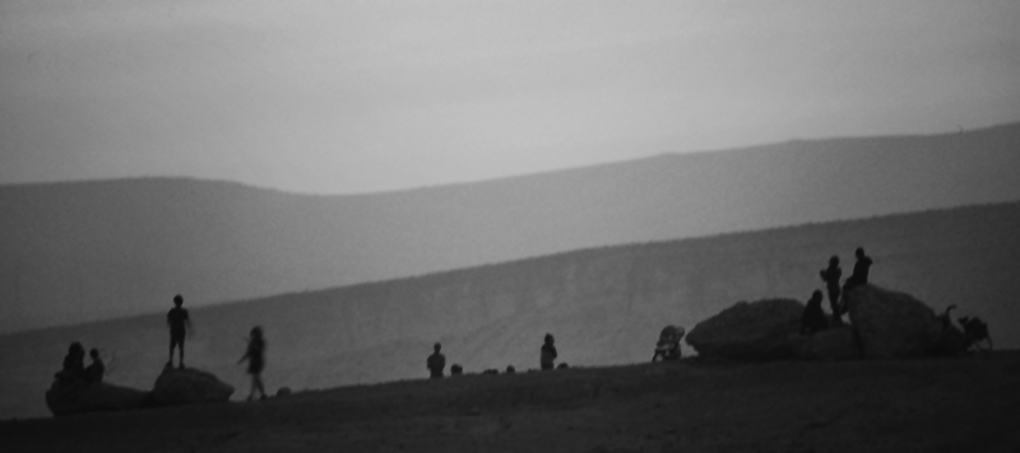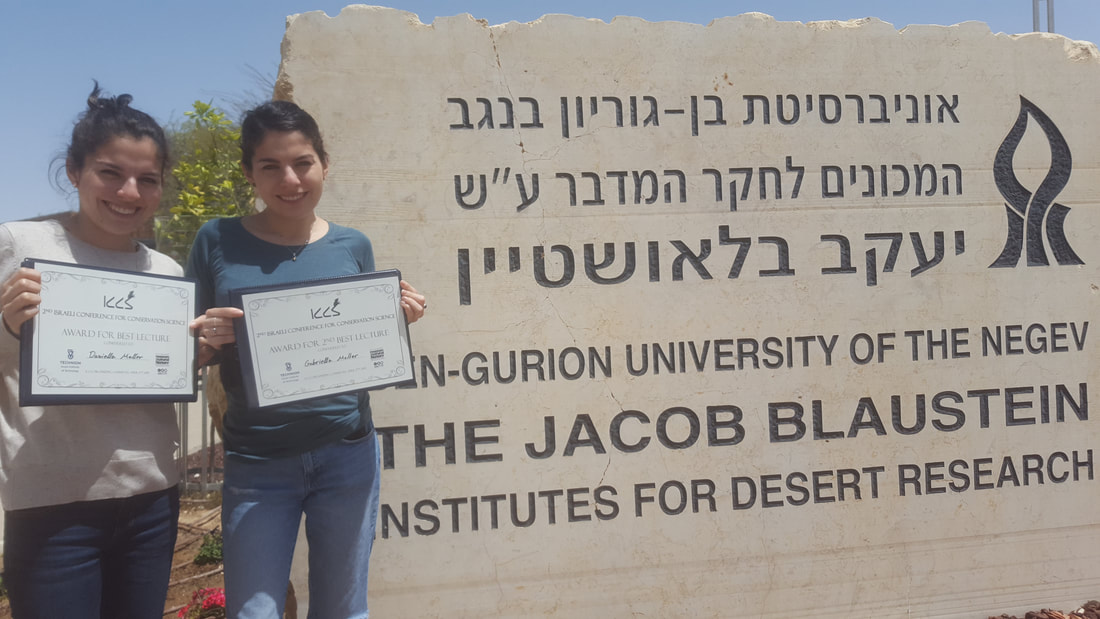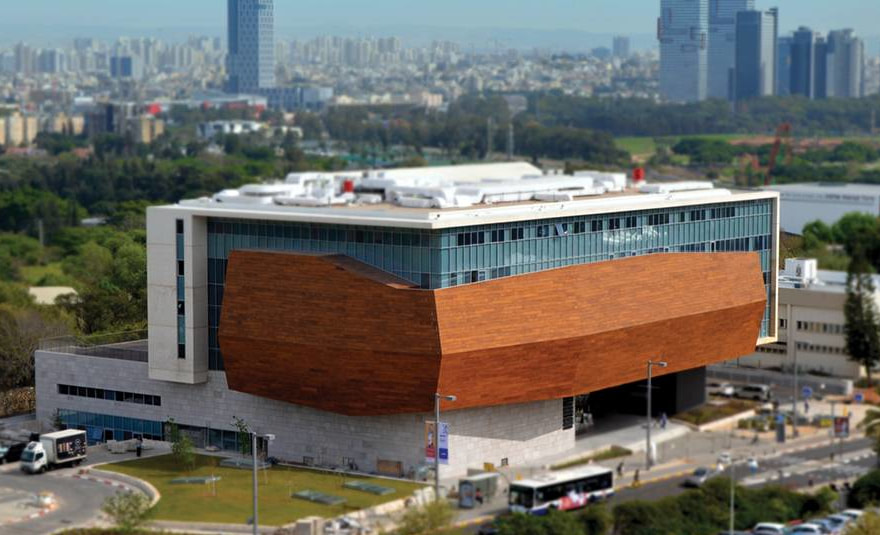The 1st Israeli Conference for Conservation Science
The 1st Israeli Conference for Conservation Science was held at the Sde-Boker Campus of the Ben-Gurion University, in April 2017. It was a huge success with 170 participants from many countries. We had two excellent keynote speakers - Prof. Hugh Possingham from the University of Queensland and the Nature Conservancy, and Prof. Richard Grenyer from the University of Oxford. Beyond that we had many other fascinating lectures, a panel discussion, vibrant poster session, social events, and field trips. The success of this meeting spurred us to continue with this tradition (bi-annually), and to suggest having such national conservation conferences in other locations. You can find the abstract booklet for all of the lecture and posters here.
The 1st Israeli Conference for Conservation Science was held at the Sde-Boker Campus of the Ben-Gurion University, in April 2017. It was a huge success with 170 participants from many countries. We had two excellent keynote speakers - Prof. Hugh Possingham from the University of Queensland and the Nature Conservancy, and Prof. Richard Grenyer from the University of Oxford. Beyond that we had many other fascinating lectures, a panel discussion, vibrant poster session, social events, and field trips. The success of this meeting spurred us to continue with this tradition (bi-annually), and to suggest having such national conservation conferences in other locations. You can find the abstract booklet for all of the lecture and posters here.
The 2nd Israeli Conference for Conservation Science
Our 2nd Israeli Conference for Conservation Science was held at the Technion - Israel Institute for Technology, in Haifa in April 2019. Our focus was on "A Sustainable Future for Humans and Nature", with keynote speakers - Prof. Kevin Gaston from the University of Exeter, and Dr. Monika Bohm from the Zoological Society of London.
You can find the abstract booklet for all of the lectures and posters here.
Our 2nd Israeli Conference for Conservation Science was held at the Technion - Israel Institute for Technology, in Haifa in April 2019. Our focus was on "A Sustainable Future for Humans and Nature", with keynote speakers - Prof. Kevin Gaston from the University of Exeter, and Dr. Monika Bohm from the Zoological Society of London.
You can find the abstract booklet for all of the lectures and posters here.
An outsider’s viewpoint of the 2nd Israeli Conference for Conservation Science
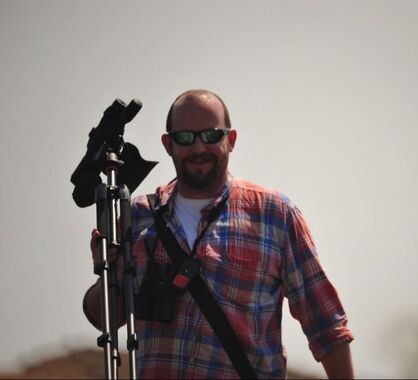 Prof. Richard Grenyer
Prof. Richard Grenyer
It was a real privilege to come to the second ICCB, two years after I gave a keynote at the inaugural conference down in Sde Boker. The intent of the conferences, it seems to me, is to help continue to establish conservation science (and I hope, too, conservation social science) as a mainstream component of research and teaching in Israel’s university system. The conferences also aim to foster an inclusive environment at which the work of practitioners and scientists in the SPNI, INPA, and elsewhere - and of early career researchers in universities of course - is as welcome and as valued as the latest research from the top professors. Both these aims seem to be becoming realized fast. To me, one of the real strengths of organismal biology courses in Israel is the continued focus on field observations: it’s at so much risk in many courses worldwide. And one of the things I saw very clearly at the second conference at the Technion in Haifa was that same field expertise being further developed through into research outside the universities, by graduates in the various branches of government and the NGOs, and quite a few collaborations that reached across the research-action gap to do meaningful conservation work. I also saw lots of great talks by young academics just getting started, and who were getting stuck in to these incredibly difficult problems - successful conservation interventions in tiny communities where rare hyaenas were killing pets, conservation planning to the meter scale, the sudden discovery of a deep water reef community just off Tel Aviv. It made me very hopeful for the future.
What would I have loved to see more of? Conservation - and conservationists - across borders. I know how hard that is right now, but meaningful conservation must follow the distributions of life on Earth as much as it can. At the inaugural conference there were two Palestinian participants, and I believe one Jordanian. This time there were none. There’s a real danger in turning inwards - we see it trivially but instructively in the UK where we spend a fortune on conserving ospreys and barn owls, to the detriment of many other species of concern, knowing that both birds matter locally but also that both have global ranges covering entire hemispheres and are not really in much trouble. So, species and habitats that are relatively common in Israel may be rare or threatened in regions beyond the border fences, and the reverse may also be true. And of course many migrating birds, drifting plant seeds and slowly-warming corals will ignore those same borders anyway. So for the third conference, I’d love to see a session, ideally with talks from conservationists in neighbouring countries, that celebrates the successes and recognizes the copious challenges of conservation in and across the geopolitics of the region. Tough, I know - but if such a session proves temporarily impossible, then someone at least must explore the potential dangers of an insular conservation. And in time, hopefully, such a session can run.
Rich Grenyer
Associate Professor, School of Geography & the Environment
Fellow and Tutor, Jesus College
University of Oxford
What would I have loved to see more of? Conservation - and conservationists - across borders. I know how hard that is right now, but meaningful conservation must follow the distributions of life on Earth as much as it can. At the inaugural conference there were two Palestinian participants, and I believe one Jordanian. This time there were none. There’s a real danger in turning inwards - we see it trivially but instructively in the UK where we spend a fortune on conserving ospreys and barn owls, to the detriment of many other species of concern, knowing that both birds matter locally but also that both have global ranges covering entire hemispheres and are not really in much trouble. So, species and habitats that are relatively common in Israel may be rare or threatened in regions beyond the border fences, and the reverse may also be true. And of course many migrating birds, drifting plant seeds and slowly-warming corals will ignore those same borders anyway. So for the third conference, I’d love to see a session, ideally with talks from conservationists in neighbouring countries, that celebrates the successes and recognizes the copious challenges of conservation in and across the geopolitics of the region. Tough, I know - but if such a session proves temporarily impossible, then someone at least must explore the potential dangers of an insular conservation. And in time, hopefully, such a session can run.
Rich Grenyer
Associate Professor, School of Geography & the Environment
Fellow and Tutor, Jesus College
University of Oxford
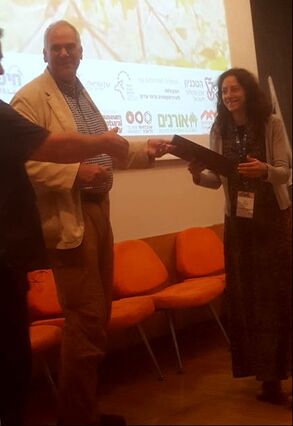 Hila Segre receiving the best 'People and Nature' lecture prize from Prof. Kevin Gaston
Hila Segre receiving the best 'People and Nature' lecture prize from Prof. Kevin Gaston
Winners of prizes at the ICCS 2019
Best Lecture first place was given to Daniella Moller from the Ben-Gurion University who spoke about the effects of oil pollution on arthropods in Evrona
Best lecture joint second place was given to Gabriella Moller from the Ben-Gurion University who spoke about parasitoid responses to management regimes in vineyards.
Yael Lenhardt from the Ben-Gurion University also received second place prize for her talk about the consequences of noise pollution in the Adulam reserve.
The Best People and Nature talk prize was awarded to Hila Segre from the Technion who spoke about linking ecosystem assessments to stakeholders in the Carmel.
Best poster prize was given to Naama Arkin from the Volcani Center, for her work on floral diversity, honeybee activity and pollination networks.
Best Lecture first place was given to Daniella Moller from the Ben-Gurion University who spoke about the effects of oil pollution on arthropods in Evrona
Best lecture joint second place was given to Gabriella Moller from the Ben-Gurion University who spoke about parasitoid responses to management regimes in vineyards.
Yael Lenhardt from the Ben-Gurion University also received second place prize for her talk about the consequences of noise pollution in the Adulam reserve.
The Best People and Nature talk prize was awarded to Hila Segre from the Technion who spoke about linking ecosystem assessments to stakeholders in the Carmel.
Best poster prize was given to Naama Arkin from the Volcani Center, for her work on floral diversity, honeybee activity and pollination networks.
|
The 3rd Israeli Conference for Conservation Science
Our 3rd Israeli Conference for Conservation Science was held at the Steinhardt Museum of Natural History, Tel-Aviv University During October 2022. The focus of this meeting was on "Species, Ecosystems, and People", with keynote speakers - Prof. Mark Burgman from the Centre for Environmental Policy, Imperial College London, London, UK, and Prof. Sean R. Connolly from the Smithsonian Tropical Research Institute, Panama City, Panama. The conference program can be found here you can download the abstract booklet here. |
